The ADA’s Promise Must Still Be Realized: A Conversation With Sean Pevsner
For 33 years, the Americans with Disabilities Act (ADA) has protected the civil rights of people with disabilities.
We recently talked to disability rights lawyer Sean Pevsner about why the ADA matters and why there’s still so much to do to see its full promise fulfilled.
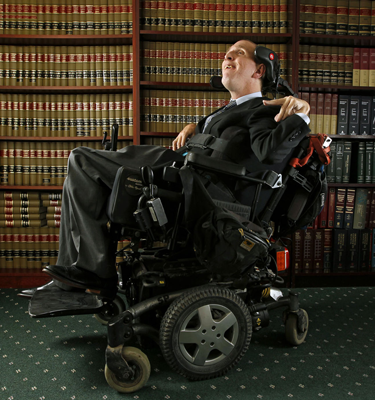 Sean founded a law firm with his best friend, Mark Whitburn. At their firm, Sean works on special education law and practice, guardianship and probate proceedings, and other civil rights cases. He focuses on the ADA, the integration of individuals with developmental disabilities into society, and ensuring that students with disabilities receive the appropriate services under the Individuals with Disabilities Education Act (IDEA).
Sean founded a law firm with his best friend, Mark Whitburn. At their firm, Sean works on special education law and practice, guardianship and probate proceedings, and other civil rights cases. He focuses on the ADA, the integration of individuals with developmental disabilities into society, and ensuring that students with disabilities receive the appropriate services under the Individuals with Disabilities Education Act (IDEA).
Sean has cerebral palsy and operates a motorized wheelchair using head movements. Due to his quadriplegia, he cannot write and must rely on an interpreter or a specialized computer to communicate.
People have underestimated Sean since the moment he was born. He was born clinically dead, and an anesthesiologist had to administer CPR for 45 minutes until Sean could breathe on his own. The anesthesiologist likely thought Sean wouldn’t survive, but Sean proved him wrong.
Sean began his schooling just as the IDEA was passed into law. When he wanted to leave the segregated private school to attend mainstream public school, he and his family had to fight to demonstrate that he could thrive there.
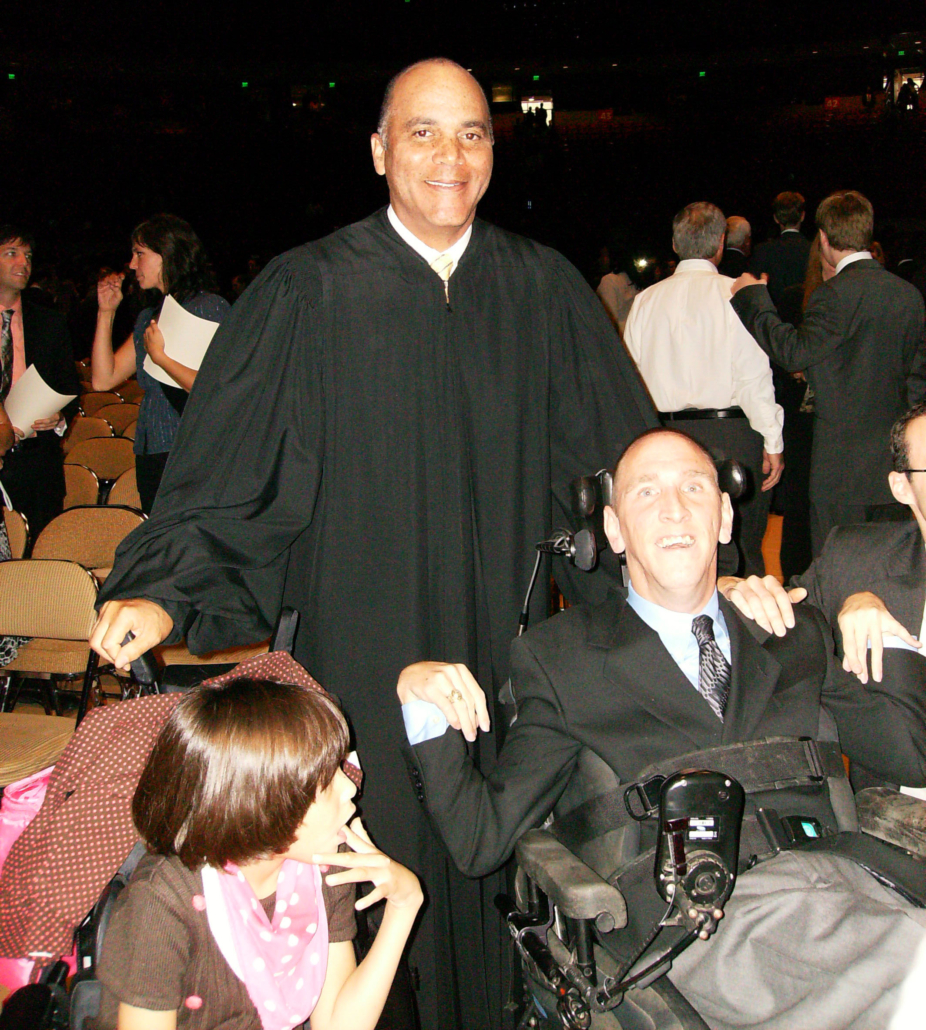
When his high school threatened to put him in remedial classes despite his excellent grades, Sean, his family, and Mark fought for his right to attend the same classes as his peers. They fought against teachers who thought he couldn’t handle the workload and administrators who thought he wouldn’t graduate. Despite doubters, Sean graduated from the University of Texas in 1998 with majors in Greek and Latin and, later, from the University of Texas Law School.
In 2011, Sean passed the Texas State Bar. It took him eight days to deliver every answer orally to interpreters. In the end, he was exhausted. At the swearing-in ceremony, Texas Supreme Court Chief Justice Wallace Jefferson specifically acknowledged Sean.
Sean was surprised to learn that the judge’s sister had invited the child of a family friend, a 9-year-old with cerebral palsy. She was seated in the front row so she could see someone like her become a professional advocate. “I did not believe anything could top my passage of the eight-day Texas Bar Exam,” says Sean, “but I was proven wrong.”
Q: What does the ADA mean to you? Why is it important to you in your personal life and your work?
The ADA means that individuals with disabilities have an equal opportunity to live and contribute to their community. It has broken down a lot of barriers to community-based services, such as community attendants, education, and employment. It also helps people with disabilities access many things that people without disabilities take for granted, like the ability to live independently in your community, without worrying about being forced into institutions, accessing education, and finding employment.
As someone with severe cerebral palsy, the ADA has helped me in many ways. My personal life has improved in terms of getting a quality education and becoming a licensed Texas attorney. I have equal access to public accommodations, such as hotels, office buildings, restaurants, and other public establishments. I have equal access to both state governmental and private entities’ programs and activities as well.
Q: In what ways is the ADA falling short 33 years after being passed?
The ADA has fallen short in increasing the employment rate for people with disabilities. While the ADA requires employers to provide effective job accommodations, it has not increased the recruitment and hiring of qualified employees with disabilities.
It also fails to eliminate institutional bias in the U.S.’s long-term care system. Even though the ADA requires state governmental entities to place people with disabilities in the most integrated setting (as the U.S. Supreme Court interpreted it in Olmstead v. LC), institutional bias is still a major issue in our country today.
Congress must pass, and the President must sign, the HCBS Access Act that would end this institutional bias. The HCBS Access Act would eliminate waiting lists for community-based services and increase wages for direct care workers.
Q: What has been the biggest or most important case you have done around the ADA?
I use the ADA to help others with disabilities get funding for community-based services to live in and contribute to society instead of being institutionalized. In Harrison v. Young, my law firm convinced a federal judge that the Texas Health and Human Services Commission (HHSC) violated Title II of the ADA by failing to provide funding to our client with multiple disabilities to live in a community group home. The HHSC attempted to place that person in an institution against their will. My law firm argued that this violated the integration mandate provision in the ADA.
Q: How can others get involved in advocacy to support the implementation of the ADA and disability rights progress?
We should conduct serious disability etiquette training to educate people about the ADA and the importance of including people with disabilities in all aspects of society. Generally, the public is uninformed about disability rights, the tenets of the ADA, and the importance of equality and inclusion of all people with disabilities.
There is also a myth that it is too expensive for the public and businesses to include and accommodate people with disabilities, both online and in person. However, the reality is that any cost is made up in increased employee productivity and access to new customers.
Finally, to achieve true inclusiveness and equality, the disability community must lead by example. We must accept others with different types of disabilities. People with polio or paraplegia must accept people with cerebral palsy, speech impairments, and intellectual disabilities. We should ensure our own community is fully inclusive of all people with disabilities and get rid of hierarchies of disabilities that separate us from working together.

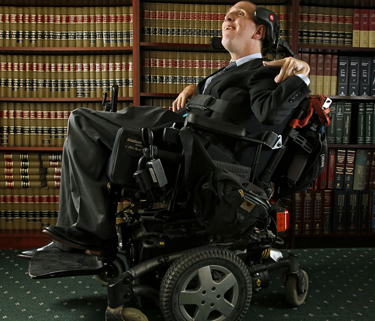

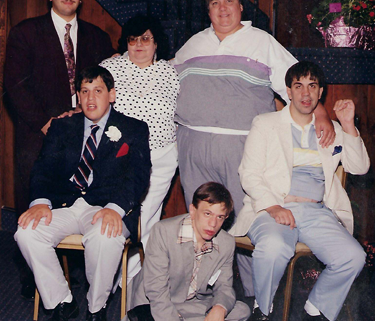

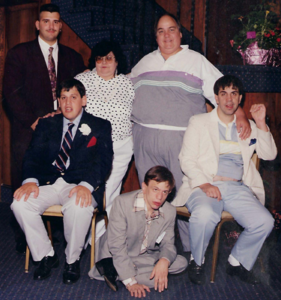 Since then, Roy Jr. and Glenn have both passed away. While both lived at home until their passing, they suffered at the hands of an underfunded system of care. Despite these losses and challenges, Roy has remained steadfast in his commitment to keeping his middle son, Michael, in his own home all his life.
Since then, Roy Jr. and Glenn have both passed away. While both lived at home until their passing, they suffered at the hands of an underfunded system of care. Despite these losses and challenges, Roy has remained steadfast in his commitment to keeping his middle son, Michael, in his own home all his life.






